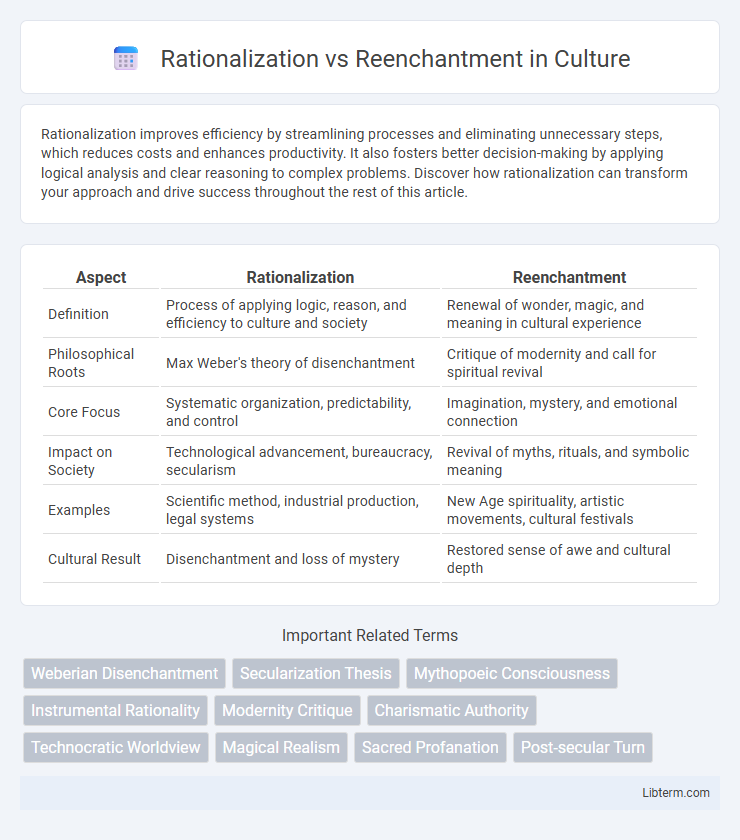Rationalization improves efficiency by streamlining processes and eliminating unnecessary steps, which reduces costs and enhances productivity. It also fosters better decision-making by applying logical analysis and clear reasoning to complex problems. Discover how rationalization can transform your approach and drive success throughout the rest of this article.
Table of Comparison
| Aspect | Rationalization | Reenchantment |
|---|---|---|
| Definition | Process of applying logic, reason, and efficiency to culture and society | Renewal of wonder, magic, and meaning in cultural experience |
| Philosophical Roots | Max Weber's theory of disenchantment | Critique of modernity and call for spiritual revival |
| Core Focus | Systematic organization, predictability, and control | Imagination, mystery, and emotional connection |
| Impact on Society | Technological advancement, bureaucracy, secularism | Revival of myths, rituals, and symbolic meaning |
| Examples | Scientific method, industrial production, legal systems | New Age spirituality, artistic movements, cultural festivals |
| Cultural Result | Disenchantment and loss of mystery | Restored sense of awe and cultural depth |
Understanding Rationalization: Definition and Origins
Rationalization refers to the process of replacing traditional and emotional thought with reason and efficiency, rooted in the works of Max Weber who identified it as a defining characteristic of modern society. It involves systematic organization, predictability, and control in social, economic, and bureaucratic institutions. The origins of rationalization trace back to the Enlightenment, emphasizing logic and scientific thought over superstition and myth.
The Concept of Reenchantment Explained
Reenchantment refers to the process of restoring meaning, wonder, and emotional depth to a world increasingly dominated by rationalization and scientific understanding. It challenges the cold, mechanistic view of reality by emphasizing spirituality, creativity, and symbolic experiences that foster a deeper connection to life. This concept highlights the human need for mystery and enchantment as essential counterbalances to the disenchantment caused by the modern rational worldview.
Historical Background: From Enlightenment to Modernity
Rationalization emerged during the Enlightenment as a paradigm emphasizing reason, scientific progress, and systematic organization, fundamentally reshaping Western society with a focus on efficiency and predictability. Reenchantment arose as a cultural and intellectual response in modernity, seeking to restore meaning, spirituality, and emotional depth to counterbalance the disenchantment seen in a highly rationalized world. This historical dialectic reflects the tension between the mechanistic worldview of the 18th and 19th centuries and contemporary efforts to integrate mysticism, art, and subjective experience.
Rationalization in Contemporary Society
Rationalization in contemporary society manifests through the increasing reliance on logic, efficiency, and standardized procedures in institutions such as education, healthcare, and bureaucracy. This systematic approach prioritizes measurable outcomes, technological advancements, and data-driven decision-making, often leading to the depersonalization of social interactions. Max Weber's theory highlights how rationalization underpins the modern world's structure, emphasizing predictability and control over traditional or spiritual values.
Signs of Reenchantment in Modern Culture
Modern culture exhibits signs of reenchantment through the resurgence of spiritual practices, the popularity of fantasy genres, and the integration of mysticism in wellness trends. This revival counters rationalization by emphasizing meaning, wonder, and connection beyond scientific explanation. Growing interests in astrology, ritual, and the supernatural reflect a deep cultural shift toward embracing mystery and enchantment in everyday life.
Rationalization vs Reenchantment: Core Differences
Rationalization emphasizes efficiency, predictability, and control through systematic procedures and logic, often reducing emotional or spiritual elements in social life. Reenchantment seeks to restore meaning, mystery, and emotional depth by reintroducing symbolic and cultural significance to counterbalance the mechanistic aspects of rationalized systems. The core difference lies in rationalization's focus on objective calculation versus reenchantment's emphasis on subjective experience and values.
Impact on Religion and Spirituality
Rationalization leads to secularization by emphasizing logic and empirical evidence, which often diminishes traditional religious beliefs and rituals. Reenchantment counters this by reviving a sense of wonder and spiritual meaning through alternative spiritual practices and renewed religious experiences. The tension between these forces shapes contemporary spirituality, influencing how individuals integrate faith in a modern, scientifically oriented world.
Influence on Art, Science, and Technology
Rationalization drives art, science, and technology toward systematic, efficient, and empirical methods, emphasizing functionality and predictability in creative and scientific processes. Reenchantment infuses these fields with emotional depth, symbolism, and imaginative exploration, fostering innovation that transcends purely logical frameworks. The dynamic interplay between rationalization and reenchantment shapes the evolution of cultural expressions, scientific paradigms, and technological advancements by balancing precision with wonder.
Social and Psychological Implications
Rationalization fosters efficiency and predictability in social institutions but often leads to disenchantment, causing individuals to experience alienation and a loss of meaning. Reenchantment reintroduces wonder and spirituality into everyday life, enhancing psychological well-being by promoting a sense of purpose and community. Balancing these processes is crucial for addressing the alienation of modern society while maintaining social order and progress.
Future Trends: Will Society Embrace Rationalization or Reenchantment?
Future trends indicate a complex interplay between rationalization and reenchantment as society advances into the digital age. The expansion of artificial intelligence and data-driven decision-making promotes rationalization by optimizing efficiency and predictability in various sectors. Simultaneously, a rising cultural emphasis on spirituality, creativity, and emotional well-being fuels reenchantment, suggesting a potential coexistence or hybrid approach in societal development.
Rationalization Infographic

 libterm.com
libterm.com